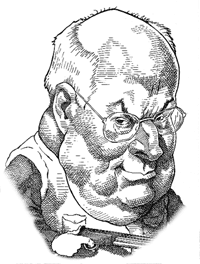Martha Rainville’s TTI2: The Summer Sequel
In a post a few weeks back called “Rainville’s Toilet-Tissue Issue,” we made the following admittedly unpleasant analogy:
You know how some people can’t go into a public restroom without dragging a piece of toilet paper out on the heel of their shoe? They’ve combed their hair and washed their hands, and then, yes, there it is, flickering at their heel like a nasty little flag of incompetence.
 This is Martha Rainville, every time she leaves the GOP’s disastrous set of leadership PACs. Every time she goes in, she manages to come out tagged by some nasty, embarrassing little . . . connection.
This is Martha Rainville, every time she leaves the GOP’s disastrous set of leadership PACs. Every time she goes in, she manages to come out tagged by some nasty, embarrassing little . . . connection.
Okay, so it’s not the most pleasant image in the world to have to contemplate, but the comparison still seems perfectly valid: the Rainville camp has proven inexplicably unable — since its formation — to anticipate the myriad ways in which national GOP fundraising excesses would impact their efforts here in Vermont.
And let’s face it: this is not nano-technology. It’s not even rocket science.
The Democrats are running against a Republican “Culture of Corruption,” tied in large part to questionable fundraising practices at all levels. That’s the only unified talking point at this stage in the game.
So if you’re Martha Rainville, you had to know that the first three questions any smart reporter would ask would be money, money, money.
 Yet, the Rainvillians allowed the first three months of their campaign to be dominated by their connections to Tom Delay, Roy Blunt, a host of disgraced PACs, and Dick Cheney. (Okay, we made up the Cheney link to justify the cartoon. But the rest are well documented.)
Yet, the Rainvillians allowed the first three months of their campaign to be dominated by their connections to Tom Delay, Roy Blunt, a host of disgraced PACs, and Dick Cheney. (Okay, we made up the Cheney link to justify the cartoon. But the rest are well documented.)
Now — like a predictable summer sequel — comes Toilet-Tissue Issue 2 (TTI2).
Burned by fundraising in the early days of the campaign, Rainville’s people clearly spent a great deal of time trying to develop a strategy that would reverse out the politics: portray Martha as the fundraising reformer, and Peter Welch as the tool of corrupt interests.
The solution? Issue a challenge to the Welch camp: abide by a one million dollar cap on advertising, and run a campaign based solely around the issues.
It must have sounded fool-proof, sitting around the big mahogany table in Williston.
Welch would be screwed either way: if he accepted, his substantial early fundraising edge would be erased, and if he declined, they could hammer him for months about his lack of ethical vision.
And either way, the Republican National Committee and a host of ravenous 527s would flood the airwaves with ads linking Welch with Jeffrey Dahmer and John Wayne Gacy. It couldn’t miss, they must have thought.
But again: this isn’t rocket science, folks. Almost immediately, some very predictable problems cropped up:
1) In order to gin up an audience, the Rainville folks sent out breathless press-releases promising a “major campaign announcement,” but refusing to provide details. This is the sort of thing that Presidential candidates do when they’re slated to announce the pick for Veep.
So needless to say, when reporters rushed to Williston and found themselves on the receiving end of what has become a standard campaign ploy in races at all levels, there were ruffled feathers. This VDB knows.
2) Predictably enough, when Rainville’s gambit hit the press, the National Republican Campaign Committee (NRCC) laughed up its collective sleeve. From The Hill:
“‘The NRCC is always going to do what the NRCC needs to do,’ a source close to the House Republicans’ campaign arm said.”
In effect, this repeats the dynamic from TTI1: Rainville speaks about the high road, but the money trail leads inexorably back down the low road.
The net effect of Rainville’s cap proposal — when you look at the coverage it’s received thus far — has been to reinforce the impression that Rainville is not in control of her own destiny. Shadowy national types hold the pursestrings, and hence the reins.
3) To their credit, upon seeing this unhappy dynamic begin to play out, the Rainvillians attempted to correct: they issued a letter from Martha telling the NRCC that she would subtract from her potential $1 million any money spent on her behalf by outside groups.
But again, it was an idea actually composed of a dense network of loopholes. Suppose the NRCC and others spend $10 million, and Martha bravely subtracts her $1 million. VDB opted out of mathematics after calculus, but that looks like plenty of dough for negative ads.
Suppose 527s run “issue ads” that compare Democrats in general to Dahmer and Gacy. Plenty of room for Rainville to demur on down the road.
4) Martha came out a day later and drew in a huge asterisk over the whole concept.
Again from The Hill:
“But Rainville appeared to undercut her pledge yesterday when she said, ‘To be very clear about this: This pledge will not include generic spending by the state party committees to get out the vote for their candidates. That spending will benefit me but cannot fairly be charged to my campaign limit.’”
Etc. and so on.
You see VDB’s point: TTI2 really is just TTI1 with better production values and a more diverting script. But when you walk out of the multiplex into the creeping summer heat, you and your friends have still picked apart all of the flaws in it long before you ever reach the parking lot.